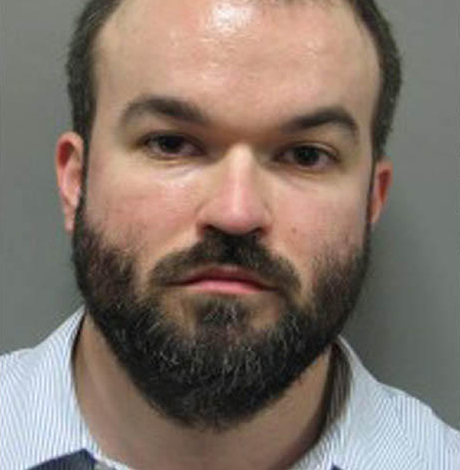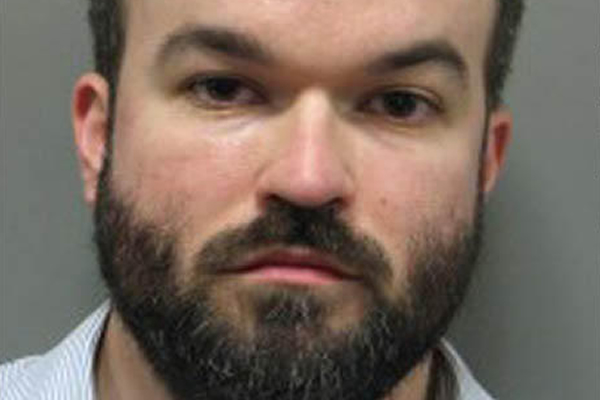Local
Md. police sting operation targeted Grindr
Local man convicted of soliciting sex from 15-year-old


Daniel Read
A Montgomery County Circuit Court judge on June 29 found a 31-year-old man guilty of soliciting sex from a 15-year-old fictional boy created by an undercover police detective who posted messages on the gay app Grindr under the name “Kinky Twinkie.”
The guilty verdict handed down for Germantown resident Daniel Read followed a one-day non-jury trial in which information surfaced that the undercover officer initially created a Grindr profile for Kinky Twinkie as a 17-year-old male high school student.
The legal age of consent in Maryland is 16.
At the time of his arrest in December, Read served as a Montgomery County District Court commissioner, a position that involves performing some of the duties of a judge, including setting bail for prisoners. He was dismissed from his job shortly after his arrest.
A police charging document filed in court says that under the profile of “Dan,” Read began to communicate with the detective posing as the student through text messages and private messages on Grindr.
“During these messages your affiant advised Dan that he (Kinky Twinky) was actually 15 years old,” the charging document says. After several additional exchanges of messages, Dan allegedly asked the student to send him nude photos of himself.
“By utilizing open source libraries, your affiant was able to obtain images to send to Dan as he requested,” says the charging document, which was prepared by the arresting officer, who is identified on the document as Det. Nick Jerman.
The document says Read eventually told the fictional student through a text message that he wanted to have sexual intercourse with him and agreed to meet him at a McDonald’s restaurant in Germantown.
According to the charging document, police officers intercepted Read in his car and arrested him on a charge of sexual solicitation of a minor as he approached the McDonald’s. It says Read had given the undercover officer posing as the student his cell phone number during a prior communication.
Police used the number to trace Read’s identity and home address. At some point before the arrest, police visited the street where Read lived and saw his car, which enabled them to recognize the car when Read drove to the McDonald’s.
“Yesterday’s verdict is clear,” said Ramon Korionoff, a spokesperson for the Montgomery County State’s Attorney’s Office, which prosecuted the case. “Do not seek out sex with a minor. Do not use social media to lure underage boys for a sexual encounter,” Korionoff said.
“The underage person you may be ‘chatting with’ might just be an undercover police officer,” he said. “Daniel Read used poor judgment and committed a criminal offense. He will be held accountable for his crime.”
Under Maryland law Read faces a sentence of up to 10 years in prison and possible placement on a sex offender registry. He is scheduled to be sentenced by Circuit Court Judge Sharon Burrell on Aug. 15.
Read’s attorney, David Moyse, said Read’s arrest took place 30 days after he and the undercover officer began communicating with each other on Grindr and after Read developed what the attorney said was an emotional bond with what he thought was a confused young man who he wanted to help.
“And the real truth is he was targeted, and for 30 days was speaking with this young man thinking that they had a real relationship,” Moyse said. “And Mr. Read identified with the idea of a sexually confused or in-the-closet 15-year-old who was being raised Catholic just like Mr. Read and who described himself as not understood by friends and family or his religion.”
According to Moyse, although Burrell said in her verdict that Read’s actions met the criteria of sexual solicitation of a minor she also found that he was “emotionally induced” to create a relationship with the fictitious student.
“They preyed on a lot of issues that Mr. Read dealt with in his own adolescence to create that bond,” said Moyse. “And in the very end they used jealousy to get him to go over the edge.”
Moyse said transcripts of hundreds of text messages between Read and the detective posing as the student, which were introduced as evidence at the trial, show that the detective repeatedly raised the issue of sex and made it clear that he wanted to have sex with Read.
“Mr. Read kept saying, look, wait until you’re 16 and it’s legal and then we’ll meet,” Moyse quoted Read as saying. “After 30 days the officer said you know what? You’re Mr. Right but I need Mr. Right Now,” Moyse recounted.
“And he went back on Grindr presumably to find another guy,” said Moyse. “And Daniel was so jealous he said fine, let’s fuck.”
It was at that point, Moyse said, that police and prosecutors determined Read crossed the line and violated the statute prohibiting sexual solicitation of a minor.
“To be very fair, they had prior conversations from Mr. Read with other people where he expressed interest in 15-year old boys and 14-year-old boys,” Moyse said. “These were all kind of internet talk. It wasn’t with actual 15-year-olds. But the judge found that he still had the desire, the predisposition to do this,” said Moyse.
“That’s why it’s not entrapment,” he said, as defined and interpreted under the law.
Moyse said he has made a request with the judge to have the sentencing postponed to allow Read to be further evaluated by a mental health professional who will prepare a pre-sentencing report for the judge.
District of Columbia
D.C. Black Pride theme, performers announced at ‘Speakeasy’
Durand Bernarr to headline 2026 programming

The Center for Black Equity held its 2026 DC Black Pride Theme Reveal event at Union Stage on Monday. The evening, a “Speakeasy Happy Hour,” was hosted by Anthony Oakes and featured performances by Lolita Leopard and Keith Angelo. The Center for Black Equity organizes DC Black Pride.
Kenya Hutton, Center for Black Equity president and CEO, spoke following the performances by Leopard and Angelo. Hutton announced this year’s theme for DC Black Pride: “New Black Renaissance.”
Performers for 2026 DC Black Pride were announced to be Bang Garcon, Be Steadwell, Jay Columbus, Bennu Byrd, Rue Pratt and Akeem Woods.
Singer-songwriter Durand Bernarr was announced as the headliner for the 2026 festivities. Bernerr gave brief remarks through a video played on the screen at the stage.
DC Black Pride is scheduled for May 22-25. For more information on DC Black Pride, visit dcblackpride.org.
Virginia
Arlington LGBTQ bar Freddie’s celebrates 25th anniversary
Owner asks public to support D.C.-area gay bars

An overflowing crowd turned out Sunday night, March 1, for the 25th anniversary celebration of Freddie’s Beach Bar, the LGBTQ bar and restaurant located in the Crystal City section of Arlington, Va.
The celebration began as longtime patrons sitting at tables and at the bar ordered drinks, snacks, and full meals as several of Freddie’s well-known drag queens performed on a decorated stage.
Roland Watkins, an official with Equality NoVa, an LGBTQ advocacy organization based in the Northern Virginia areas of Arlington, Alexandria, and Fairfax County, next told the gathering about the history of Freddie’s Beach Bar and the role he said that owner Freddie Lutz has played in broadening the bar’s role into a community gathering place.
“Twenty-five years ago, opening a gay bar in Arlington was not a given,” Watkins told the crowd from the stage. “It took courage, convincing, and a deep belief that our community belongs openly, visibly, and proudly,” he said. “And that belief came from Freddie.”
Watkins and others familiar with Freddie’s noted that under Lutz’s leadership and support from his staff, Freddie’s provided support and a gathering place for LGBTQ organizations and a place where Virginia elected officials, and candidates running for public office, came to express their support for the LGBTQ community.
“Over the past 25 years, Freddie’s has become more than a bar,” Watkins said. “It has become a community maker.”
Lutz, who spoke next, said he was moved by the outpouring of support from long-time customers. “Thank you all so much for coming tonight and thank you all so much for your support over the past 25 years,” he said. “I can’t tell you how much that means to me and how much it’s kept me going.”
But Lutz then said Freddie’s, like many other D.C. area gay bars, continues to face economic hard times that he said began during the COVID pandemic. He noted that fewer customers are coming to Freddie’s in recent years, with a significant drop in patronage for his once lucrative weekend buffet brunches.
“So, I don’t want to be the daddy downer on my 25-year anniversary,” he said. “But this was actually the worst year we’ve ever had,” he added. “And I guess what I’m asking is please help us out. Not just me, but all the gay bars in the area.” He added, “I’m reaching out and I’m appealing to you not to forget the gay bars.”
Lutz received loud, prolonged applause, with many customers hugging him as he walked off the stage.

In an official statement released at the reveal event Capital Pride Alliance described its just announced 2026 Pride theme of “Exist, Resist, Have the Audacity” as a “bold declaration affirming the presence, resilience, and courage of LGBTQ+ people around the world.”
The statement adds, “Grounded in the undeniable truth that our existence is not up for debate, this year’s theme calls on the community to live loudly and proudly, stand firm against injustice and erasure, and embody the collective strength that has always defined the LGBTQ+ community.”
In a reference to the impact of the hostile political climate, the statement says, “In a time when LGBTQ+ rights and history continue to face challenges, especially in our Nation’s Capital, where policy and public discourse shape the future of our country, together, we must ensure that our voices are visible, heard, and unapologetically centered.”
The statement also quotes Capital Pride Alliance CEO and President Ryan Bos’s message at the Reveal event: “This year’s theme is both a declaration and a demand,” Bos said. “Exist, Resist, Have Audacity! reflects the resilience of our community and our responsibility to protect the progress we’ve made. As we look toward our nation’s 250th anniversary, we affirm that LGBTQ+ people have always been and always will be part of the United States’s history, and we will continue shaping its future with strength and resolve,” he concluded.
-

 India5 days ago
India5 days agoActivists push for better counting of transgender Indians in 2026 Census
-

 Advice5 days ago
Advice5 days agoDry January has isolated me from my friends
-

 District of Columbia5 days ago
District of Columbia5 days agoCapital Pride reveals 2026 theme
-

 National4 days ago
National4 days agoAfter layoffs at Advocate, parent company acquires ‘Them’ from Conde Nast



















